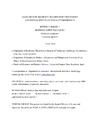Identificador persistente para citar o vincular este elemento:
https://accedacris.ulpgc.es/jspui/handle/10553/19089
| Campo DC | Valor | idioma |
|---|---|---|
| dc.contributor.author | González López-Valcárcel, Beatriz | es |
| dc.contributor.author | Barber Pérez, Patricia | es |
| dc.contributor.author | Ortún, Vicente | es |
| dc.date.accessioned | 2016-11-10T03:30:32Z | |
| dc.date.accessioned | 2018-03-16T09:12:57Z | - |
| dc.date.available | 2016-11-10T03:30:32Z | |
| dc.date.available | 2018-03-16T09:12:57Z | - |
| dc.date.issued | 2016 | es |
| dc.identifier.uri | https://accedacris.ulpgc.es/handle/10553/19089 | |
| dc.description.abstract | In Spain's “MIR” system, medical school graduates are ranked by their performance on a national exam and then sequentially choose from the available residency training positions. We took advantage of a unique survey of participants in the 2012 annual MIR cycle to analyze preferences under two different choice scenarios: the residency program actually chosen by each participant when it came her turn (the “real”); and the program that she would have chosen if all residency training programs had been available (the “counterfactual”). Utilizing conditional logit models with random coefficients, we found significant differences in medical graduates' preferences between the two scenarios, particularly with respect to three specialty attributes: work hours/lifestyle, prestige among colleagues, and annual remuneration. | es |
| dc.format | application/pdf | es |
| dc.language | eng | es |
| dc.rights | by-nc-nd | es |
| dc.source | "Health Economics, 2016\n " | es |
| dc.subject | 531207 Sanidad | es |
| dc.subject.other | MIR | es |
| dc.subject.other | personal de la sanidad pública | es |
| dc.subject.other | España | es |
| dc.title | Allocation of residency training position in Spain: contextual effects on speciality preferences | es |
| dc.type | info:eu-repo/semantics/article | es |
| dc.type | info:eu-repo/semantics/article | es |
| dc.type | Article | es |
| dc.identifier.absysnet | 728805 | es |
| dc.identifier.crisid | 455;2311;- | |
| dc.investigacion | Ciencias Sociales y Jurídicas | es |
| dc.project.acronym | PHYSICIAN CHOICES | es |
| dc.project.classification | Investigación | es |
| dc.project.end | 2013-12-31 | es |
| dc.project.extension | 2014-06-30 | es |
| dc.project.reference | ECO2010-21558 | es |
| dc.project.scope | Estatal | es |
| dc.project.sponsorship | Ministerio de Ciencia e Innovación | es |
| dc.project.start | 2011-01-01 | es |
| dc.project.title | La elección de especialidad médica como problema econométrico y como elemento para el diseño de las políticas educativa, laboral y sanitaria | es |
| dc.project.type | Proyecto | es |
| dc.rights.accessrights | Acceso libre | es |
| dc.type2 | Artículo | es |
| dc.identifier.ulpgc | Sí | es |
| item.grantfulltext | open | - |
| item.fulltext | Con texto completo | - |
| crisitem.author.dept | GIR Economía de la salud y políticas públicas | - |
| crisitem.author.dept | Departamento de Métodos Cuantitativos en Economía y Gestión | - |
| crisitem.author.dept | GIR Economía de la salud y políticas públicas | - |
| crisitem.author.dept | Departamento de Métodos Cuantitativos en Economía y Gestión | - |
| crisitem.author.orcid | 0000-0002-5571-3257 | - |
| crisitem.author.orcid | 0000-0001-8904-8358 | - |
| crisitem.author.parentorg | Departamento de Métodos Cuantitativos en Economía y Gestión | - |
| crisitem.author.parentorg | Departamento de Métodos Cuantitativos en Economía y Gestión | - |
| crisitem.author.fullName | González Lopez-Valcarcel, Beatriz | - |
| crisitem.author.fullName | Barber Pérez, Patricia Lucía | - |
| Colección: | Artículos | |
Visitas
244
actualizado el 15-ene-2026
Descargas
103
actualizado el 15-ene-2026
Google ScholarTM
Verifica
Comparte
Exporta metadatos
Los elementos en ULPGC accedaCRIS están protegidos por derechos de autor con todos los derechos reservados, a menos que se indique lo contrario.
